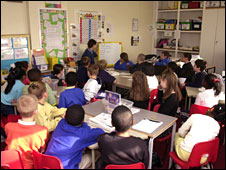Services

By Calum Liddle and Myles Edwards
Children in Scotland are not
prepared for the economic shift
to the environmental sector,
according to industry leaders.
The chief operating officer of
Renewable Energy Systems,
which owns and operates a
growing portfolio of wind farms,
claims Scotland’s schools are
"not up to the job".
Gordon MacDougall criticised the current educational approach adopted by the government, and called for "a more joined up approach to education" so that children "can take advantage of career opportunities in our sector".
He said: "This is a critical issue considering the scale of development needed to meet the 2020 targets and beyond.
"The expansion of the renewable energy sector offers significant employment opportunities. However, the industry faces a current and worsening skills shortage in Scotland."
In the current Higher and Standard Grade system, environmental studies including climate change, ecology and renewable technologies are divided in the curriculum between geography, modern studies and biology.
Managing Environmental Resources (MER), a stand-alone subject available in Scotland from Access level through to Higher, was studied by just 126 students last year and is not widely available.
Derek Douglas, of the Scottish Qualifications Authority said: "The environment, in the broadest sense, is already a significant area of study in primary and secondary schools throughout Scotland so it's certainly not being neglected.
"MER draws on aspects of geography, chemistry, physics, biology, modern studies and personal and social education (PSE). It is designed to provide candidates with a broad-based scientific education, develop skills of observation, recording, communication and analysis, foster positive attitudes towards caring for the use of earth resources and develop awareness of the natural environment."
MER is also one of the science subjects which students can choose to study as part of the new Scottish Baccalaureate in science qualification with first awards due in 2010.
The news comes just days after Scottish & Southern Energy - the UK’s biggest producer of renewable electricity – announced it is to build a £20m European green energy headquarters in Glasgow.
Some 250 high-end jobs, all paid more than £50,000 a year, will be created.
A Scottish Government spokesman said: "With our climate change legislation in place – the most ambitious and far reaching in the world – we are focused on making Scotland a global player in renewable and low carbon technology.
"Scotland is already well recognised as having a wide range of skills and expertise in our universities, our research centres and in our energy companies."
The government maintained Scotland was "by far ahead of the UK" with the formation of a Renewable Energy Skills Group for the burgeoning renewables industry.
The spokesman continued: "Our Renewables Action Plan, includes a Framework for Action on skills to ensure we maintain a world class skills base in a rapidly changing technological environment.
"The Action Plan will be updated every six months to take account of the latest developments. That is the way we will stimulate a leading renewables industry and play our part in tackling climate change."

